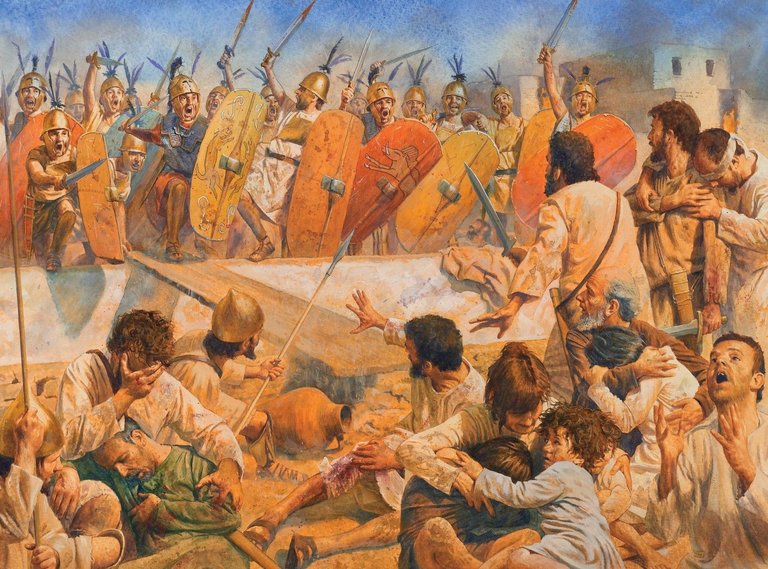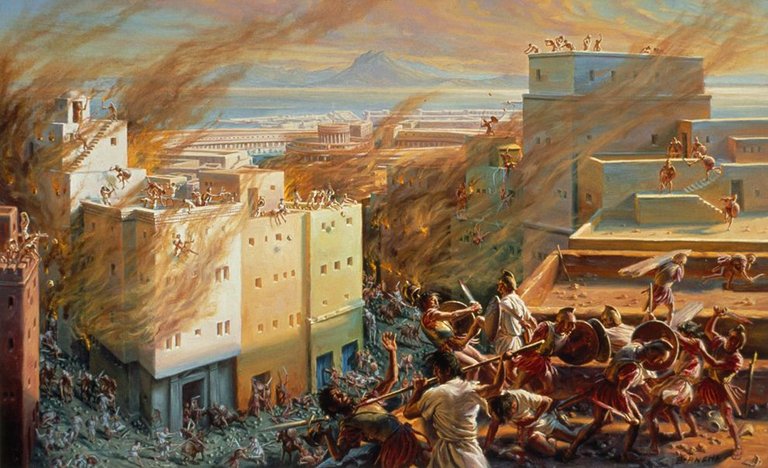After Scipio Africanus travels to Spain to break up Carthage's hold of it, Hannibal is unable to receive anymore support from it. However, he isn't being starved out completely. He ends up finding support throughout Italy from Greek colonies, and Macedonian kings sending supplies. Eventually, Rome turns to desperate measures to defend itself.

Scipio Africanus
We return to Scipio who once again appears before the Senate to propose another plan - the only way to get Hannibal out is if Carthage is under attack. The senate goes back and forth on this idea until finally they allow him to go, however he would have to gather his own men and pay for everything himself. When Scipio begins to round up his own soldiers, he travels to Sicily to find the nearly 10,000 men that were exiled after the battle of Cannae. Astonishingly, they agree to join his legion despite being shunned by Rome. These men end up becoming the backbone of Scipio's army.
In order to get to Carthage, Scipio engaged in diplomacy. He traveled to Africa and attempted to gain neutrality or support from other African kings. Hannibal begins doing the same thing and sometimes they ended up at the same place at the same time.
Zama
The first battle took place here in Zama in 202 B.C. Before it began, Hannibal offered to make peace and end everything now that he was out of Italy, but Scipio refused - he wanted his head. Hannibal used war elephants that were trained to charge forward and stomp the enemy. In response, Scipio trained his men to step aside once the elephants charged. Upon noticing the lack of damage from the attack, the elephants would turn around and charge back, destroying Hannibal's own line. These elephants ended up doing more damage to Hannibal than the Romans. By defeating Hannibal at Zama, this puts an official end to the second Punic War.

Results
Carthage had nothing it could do except unconditionally surrender since the back of their army was broken. They lost so badly, they had to pay up as the Romans demanded an indemnity of 10,000 talents. The Romans gave them 50 years to pay this indemnity because to them it wasn't about the money, but about vengeance. After this battle as well, Rome adds Spain to the empire.
Hannibal survives but the Romans had an incredible ability to hold grudges. They never stopped hunting him; no matter where he fled, the Romans were close behind. In the end however, he committed suicide by ingesting poison because he knew the Romans would eventually catch up to him.
Tensions Rise Again
The indemnity demanded by the Romans did not end the prosperity of Carthage - they were able to pay it off much sooner than expected. Rome was not happy about Carthage regaining prosperity so quickly. However there came a point in c. 250 B.C where Rome didn't have enough grain and couldn't import. Carthage does have grain so they send word that it would like to purchase some. The Carthaginians, who were so anxious to please Rome, tell the Romans they don't need to purchase it, that they'll give it for free.
They thought they were making this grand gesture by hunkering down before them but the Romans felt utterly insulted. They believed the Carthaginians thought they couldn't pay for it and were trying to say "we paid you off, now we'll top it off with grain". Now the Romans begin making demands of Carthage because they're so angry. At one point they demand Carthage to send all of their eldest aristocratic sons; they rounded up 700-800 and send them off to Rome, where they were executed. They kept making more demands and the Carthaginians complied simply because they didn't want anymore trouble. None of this made Rome feel any better.
Finally, after much anger and frustration Rome demands Carthage to move inland - they felt now was the time to break the back of their civilization. If they moved, they wouldn't have a harbor and would be unable to continue trading, which is where their wealth came from. At this point they felt they had not other choice but to fight because they knew they would die either way, so they armed every citizen so that every house became a fortress.
The Third Punic War
Scipio Aemelianus, grandson of Africanus, led the army that sailed to Carthage in 149 B.C. They sieged the city for three years before finally being able to enter. When Aemelianus enters, it's horrific - they had to go to every single house and sweep it out. As a result it's utter destruction of the city, killing everybody they could and taking no survivors. Out of 300,000 people, only about 50,000 survived, which were promptly sold into slavery. The city of Carthage was razed to the ground.

This final assault brought the Punic Wars to an end in 146 B.C. As horrific as it all was, without them Rome would still be just a small city. Afterwards, Rome becomes a huge empire and such an empire brings wealth, taxes, new fertile lands, and slaves. The Punic Wars sow the seeds of not just greatness, but of destruction to Rome. It turns them into a great empire, but they never knew how to effectively deal with that empire.
more content like this!
That's what I plan to do! :)